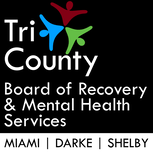 Nate Cade (left) of Troy portrays a student in mental health crisis as Upper Valley Career Center instructor Ralph Ash practices techniques learned during Crisis Intervention Team training. Others in the CIT course observed the interactions through two-way video, seen in the background.
Nate Cade (left) of Troy portrays a student in mental health crisis as Upper Valley Career Center instructor Ralph Ash practices techniques learned during Crisis Intervention Team training. Others in the CIT course observed the interactions through two-way video, seen in the background. CIT is a nationally recognized program that teaches law enforcement officers safe and effective approaches to handling crisis incidents involving a mentally ill individual. The CIT Companion Course for Teachers provides teachers and other school personnel with the knowledge and skills needed to respond effectively when a student is experiencing a behavioral health crisis. The training is conducted under the instructional supervision of local behavioral health professionals and law enforcement officers.
The program consists of a review of mental illness types, causes and symptoms; services and resources available in the community; structured de-escalation techniques; and scenario-based training. The workshop is led by Jodi Long, LISW, LICDC, Director of Clinical Services and Evaluation and CIT Coordinator for the Tri-County Board. Long was joined all three days by Mike McRill of the Sidney Police Department, and Karen McRill of Sidney City Schools. Other presenters included representatives from courts, mental health providers, other law enforcement agencies, and persons living with mental illness.
"Teachers spend so much time with our young people, and at such a critical age in their emotional development, it is extremely important that they recognize when a situation is more than 'kids being kids' and to involve mental health professionals when appropriate," Long said. "What we hope these teachers come away with is a better appreciation for the outward signs of mental health crisis in young people, a sense of empowerment to de-escalate a situation, and knowledge of the local resources available to deal with a crisis."
After two full days of presentations, much of the third day is spent in role-playing scenarios. Volunteer students from Troy acted out scenes depicting various types of mental health crises. Teachers and staff were challenged to identify and de-escalate the situation in line with the training techniques, to ensure the safety and well-being of the student in crisis, other students in the area, and the teacher and staff. While the scenarios played out, the rest of the class watched and listened via two-way video, and the actions were critiqued by mental health and law enforcement professionals.
In addition to the school staff companion course, more than 170 law enforcement officers and professionals in Darke, Miami and Shelby counties have completed the Crisis Intervention Team Academy, and companion courses have been presented for emergency dispatchers, jail and corrections personnel, and mental health workers. CIT training is made possible by funds from the Tri-County mental health levy.

 RSS Feed
RSS Feed
